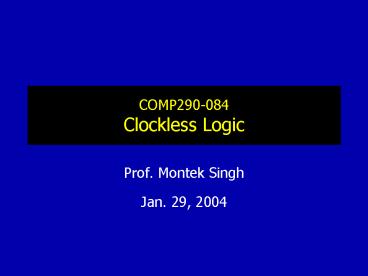COMP290-084 Clockless Logic - PowerPoint PPT Presentation
Title:
COMP290-084 Clockless Logic
Description:
Classic 2-Level Logic Minimization. Step 1. Generate Prime Implicants. 0 0. 0 1 ... Classic (Quine-McCluskey): On-set minterms, Prime implicants Hazard-Free: ... – PowerPoint PPT presentation
Number of Views:36
Avg rating:3.0/5.0
Title: COMP290-084 Clockless Logic
1
COMP290-084Clockless Logic
- Prof. Montek Singh
- Jan. 29, 2004
2
Acknowledgment
- Michael Theobald and Steven Nowick, for providing
slides for this lecture.
3
An Implicit Method for Hazard-Free Two-Level
Logic Minimization
- Michael Theobald and Steven M. Nowick
- Columbia University, New York, NY
- Paper appeared in Async-98
- (Best Paper Finalist)
4
Hazard-Free Logic Minimization
Given Boolean function and multi-input change
?
5
Hazard-Free Logic Minimization
?
6
Hazard-Free Logic Minimization
?
?
f(A) ? f(B)
0 ? 0
0 ? 1
1 ? 1
1 ? 0
7
Hazard-Free 2-Level Logic Minimization
?
8
Classic 2-Level Logic Minimization
Quine-McCluskey Algorithm
- Step 1. Generate Prime Implicants
Step 2. Select Minimum of Primes to cover all
Minterms
9
2-level Logic MinimizationClassic vs.
Hazard-Free
- Classic (Quine-McCluskey) ltOn-set minterms,
Prime implicantsgt - Hazard-Free ltRequired cubes, DHF-Prime
implicantsgt - Given Boolean function set of multi-input
changes - Find min-cost 2-level implementation guaranteed
to be glitch-free - Required cubes sets of minterms
- DHF-Prime implicants
- maximal implicants that do not intersect
privileged cubes illegally
10
Hazard-Free Logic Minimization
Multi-Input Changes
- Non-monotonic
- function hazard
- no implementation
- hazard-free
- Monotonic
- function-hazard-free
?
?
Restriction to monotonic changes
11
Hazard-Freedom Conditions 1 -gt 1 transition
?
?
Required Cube
must be covered
12
Hazard-Freedom Conditions 1 -gt 0 transition
13
Hazard-Freedom Conditions 1 -gt 0 transition
14
Hazard-Freedom Conditions 1 -gt 0 transition
15
Hazard-Freedom Conditions 1 -gt 0 transition
16
Hazard-Freedom Conditions 1 -gt 0 transition
17
Hazard-Freedom Conditions 1 -gt 0 transition
?
18
Hazard-Freedom Conditions 1 -gt 0 transition
?
illegal intersection
19
Hazard-Freedom Conditions 1 -gt 0 transition
? No illegal intersection of privileged cube
?
illegal intersection
20
Dynamic-Hazard-Free Prime Implicants
NO DHF-Primeillegal intersection
Prime
21
2-level Logic MinimizationClassic vs.
Hazard-Free
- Classic (Quine-McCluskey) ltOn-set minterms,
Prime implicantsgt - Hazard-Free ltRequired cubes, DHF-Prime
implicantsgt - Given Boolean function set of multi-input
changes - Find min-cost 2-level implementation guaranteed
to be glitch-free - Required cubes sets of minterms
- DHF-Prime implicants
- maximal implicants that do not intersect
privileged cubes illegally
Main challenge Computing DHF-prime implicants
22
Hazard-Free 2-level Logic MinimizationPrevious
Work
- Early work (1950s-1970s)
- Eichelberger, Unger, Beister, McCluskey
- Initial solution Nowick/Dill ICCAD 1992
- Improved approaches
- HFMIN Fuhrer/Nowick ICCAD 1995
- Rutten et al. Async 1999
- Myers/Jacobson Async 2001
No approach can solve large examples
23
IMPYMIN an exact 2-level minimizer
- Two main ideas
- novel reformulation of hazard-freedom
constraints - used for dhf-prime generation
- recasts an asynchronous problem as a synchronous
one - uses an implicit method
- represents manipulates large of objects
simultaneously - avoids explicit enumeration
- makes use of BDDs, ZBDDs
- Outperforms existing tools by orders of magnitude
24
Review Primes vs. DHF-Primes
- Classic (Quine-McCluskey)
- ltOn-set minterms, Prime implicantsgt
- Hazard-Free
- ltRequired cubes, DHF-Prime implicantsgt
- DHF-Prime Implicants maximal implicants that do
not intersect privileged cubes illegally
Primes
DHF-Primes
25
Topic 1 New Idea
DHF-Prime Generation
- Challenge Two types of constraints
- maximality constraints we want maximally large
implicants - avoidance constraints we must avoid illegal
intersections
- New Approach Unify constraints by lifting the
problem into a higher-dimensional space
f(x1,,xn), T maximality
avoidance constraints
g(x1, , xn, z1, , zl) maximality
26
Auxiliary Synchronous Function g
f
Add one new dimension per privileged cube
0 0 0 1 1 1 1 0
0 0 1 0 0 0 0 0
0-half-space g is defined as f
g
1-half-space g is defined as f
BUT priv-cube is filled
with 0s
z0
z1
27
Prime Implicants of g
f
Expansion in z-dimensionguarantees avoidance of
priv-cube in original domain
g
28
Prime Implicants of g
f
Expansion in x-dimension corresponds to
enlarging cube in original domain.
g
29
Summary Auxiliary Synchronous Function g
- The definition of auxiliary function g exactly
ensures - Expansion in a z-dimension corresponds to
avoiding the privileged cube in the original
domain. - Expansion in a x-dimension corresponds to
enlarging the cube in the original domain.
30
New approach DHF-Prime Generation
- Goal Efficient new method for DHF-Prime
generation - Approach
- translate original function f into synchronous
function g - generate Primes(g)
- after filtering step, retrieve dhf-primes(f)
31
Prime Generation of g
f
g
Prime implicants of g
32
Filtering Primes of g
Transforming Prime(g) into DHF-Prime(f,T)
- 3 classes of primes of synchronous fct g
- 1. do not intersect priv-cube (in original
domain) - 2. intersect legally
- 3. intersect illegally
f
Lifting
g
Prime implicants of g
33
Projection
f
DHF-Prime(f,T)
Lifting
g
Prime implicants of g
34
Formal Characterization of DHF-Prime(f,T)
35
IMPYMIN
- CAD tool for Hazard-Free 2-Level Logic
- Two main ideas
- Computes DHF-Primes in higher-dimension space
- Implicit Method makes use of BDDs, ZBDDs
36
What is a BDD ?
- Compact representation for Boolean function
a
1
0
b
c
0
1
37
What is implicit logic minimization?
- Classic Quine-McCluskey
- Scherzo Coudert (implicit logic minimization)
?
38
IMPYMIN Overview Implicit Hazard-free 2-Level
Minimizer
Scherzos Implicit Solver
objects-to-be-covered
f, T
covering objects
39
Impymin vs. HFMIN Results
added variables
z
39
23
0
9
0
40
IMPYMIN Conclusions
- New idea incorporate hazard-freedom constraints
- transformed asynchronous problem into
synchronous problem - Presented implicit minimizer IMPYMIN
- significantly outperforms existing minimizers
- Idea may be applicable to other problems, e.g.
testing































